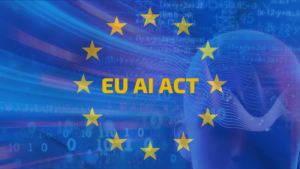Navigating the EU AI Act: Implications for recruiters and employers
Introduction
The European Commission’s forthcoming EU AI Act is set to introduce significant regulations surrounding the use of artificial intelligence (AI) in the workplace. This groundbreaking legislation, expected to be adopted by the end of 2023, carries implications for recruiters and employers alike, particularly those with operations in mainland Europe. In this blog post, we will explore the key aspects of the EU AI Act, its impact on organisations, and how HR professionals/ Leadership teams should interpret and comply with its requirements.
 The Scope and Reach of the EU AI Act
The Scope and Reach of the EU AI Act
The EU AI Act represents a milestone in AI regulation and is anticipated to serve as a model for similar legislation globally. Its reach extends beyond EU borders, affecting providers and users of AI systems worldwide, as long as the system’s output is used within the EU. This act covers a broad definition of AI and machine learning, making it applicable to both EU-based and non-EU-based providers.
Prohibited Practices and High-Risk AI Systems
The EU AI Act addresses three primary categories of risk.
- Firstly, it prohibits certain AI practices, such as social scoring and subliminal techniques that manipulate behaviour.
- Secondly, it introduces specific legal requirements for high-risk AI systems used in recruitment, employee evaluation, task allocation, and decision-making related to promotion or termination.
- Thirdly, low-risk AI systems, such as chatbots, are subject to existing laws with minimal additional regulations.
Compliance Obligations for High-Risk AI Systems
Employers heavily relying on AI technology for recruitment, employee assessment, and decision-making must pay close attention to the EU AI Act. These high-risk AI systems come with the highest compliance obligations. To ensure compliance, organisations must eliminate bias from AI decision outputs, as mandated by the Act. This extends beyond protected characteristics to encompass all potential biases, emphasising the importance of equal treatment and non-discrimination.
Verifying Automated Decisions and Employee Communication
To comply with the EU AI Act, employers must verify any automated decisions made by AI systems before initiating any formal performance management processes, especially if underperformance leads to termination. Additionally, Article 22 of the UK General Data Protection Regulation (UK GDPR) requires individuals to have the right to human verification when decisions significantly impact them. Employers should keep employees informed about the use of AI decision-making, ideally through the staff privacy notice.
Ethics and Bias Prevention
A central focus of the EU AI Act is the prevention of bias within AI systems. Employers are already obligated by existing employment law to avoid discrimination based on protected characteristics. However, the Act broadens this obligation, demanding providers to ensure that AI tools are free from any bias, regardless of the characteristics involved. Employers must carefully monitor their AI systems to prevent inadvertent bias and potential discrimination.
Conclusion
The EU AI Act ushers in a new era of AI regulation, encompassing the use of AI in recruitment, employee evaluation, and decision-making processes. Recruiters and employers must familiarise themselves with the Act’s requirements and comply with its provisions to avoid potential penalties and ensure fair treatment of employees. As the EU AI Act sets the standard for AI regulation globally, organisations worldwide should pay close attention to its development and anticipate similar legislation in their respective jurisdictions. By staying informed and adapting their AI practices accordingly, employers can navigate this new era of AI regulation successfully.
If you use AI in your people practices, or are contemplating it and you wish to discuss this advice further please do get in touch on hello@HROptimisation.co.uk
Categories
- Coaching (9)
- CSR (1)
- Culture (1)
- Culture & Engagement (33)
- Diversity and Inclusion (16)
- Employment law (38)
- Inspiration (12)
- Leadership (14)
- Learning & Development (7)
- Recruitment (12)
- Reward (9)
- Self-development (2)
- Tips & tricks (11)
- Uncategorized (18)
- Welfare and Wellbeing (26)
